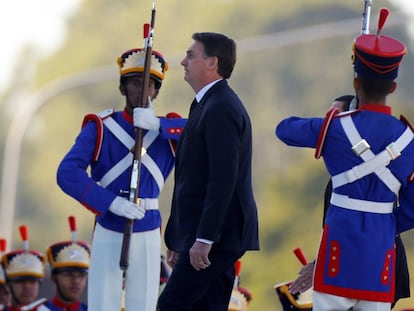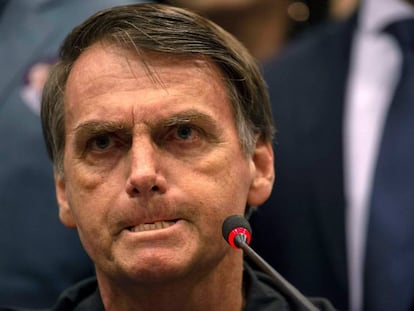Dilma Rousseff: ¡°The Brazilian government is neo-fascist¡±
Speaking to EL PA?S, the former president argues that Jair Bolsonaro is destroying the Amazon and the sovereignty of the Latin American giant
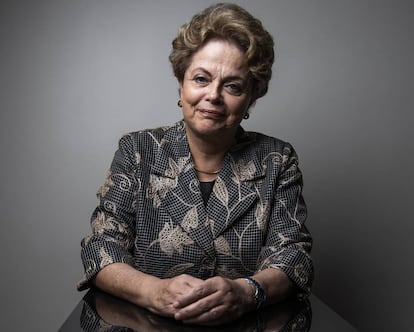

One might describe Dilma Rousseff, 71, as a left-wing activist who has turned into a technocrat. But above all, Dilma is a fighter. She was the first woman to hold the presidency of Brazil, serving from 2011 to 2016. She was a youth activist who entered the front lines of politics at the helm of the state oil company Petrobras; later she served as energy minister and chief of staff to Lula da Silva during the latter¡¯s last term in office. These positions helped her carve out a reputation as an ¡°iron lady,¡± thanks to her strict management style, capacity for work and familiarity with technical issues.
Rousseff was born to middle-class Bulgarian immigrants in the southwestern state of Minas Gerais, where she graduated from university with a degree in economics. After the 1964 coup that brought a military dictatorship to power, she joined radical left-wing groups. She says that she never participated in any armed confrontation, but she was arrested and tortured, and spent three years in prison.
Selected by Lula to carry on with his legacy against a backdrop of economic prosperity that lifted 40 million Brazilians into the middle class, Rousseff sailed to an easy victory in 2010 and won re-election four years later. But they were leaner times, and society demanded reforms that kept getting postponed. Rousseff presided over a period of economic stagnation while her Workers Party (PT) got caught up in a spiral of corruption. It was ironic that a president who had been much tougher on corruption than her predecessors ¨C during her first term in office she fired six ministers who were under court investigation ¨C ended up as a victim of corruption herself, after the right-wing opposition used a legal loophole to remove her from power.
I¡¯ve never been the type to say: Oh poor me, I¡¯m all alone
Many things have happened since then. Rousseff has survived cancer; her successor and political executioner Michel Temer is facing corruption inquiries himself, and in November of last year Brazilians chose as their president Jair Bolsonaro, a far-right populist whom Rousseff unhesitatingly describes as a ¡°neo-fascist.¡± Dilma, as she is popularly known in Brazil, was recently in Madrid to participate in events organized by the Spanish Communist Party (PCE) and the trade union UGT, because, she explains, ¡°the left must remain united and not lose hope.¡±
Question. The United Nations is debating climate change in the wake of the Amazon fires, but Jair Bolsonaro seems headed in a different direction on this and on other issues¡
Answer. It seems to me that he is not only destroying the Amazon, but the sovereignty of Brazil as well. The country has a preserved area that is 11 times the size of Spain. All of that is now under threat. The process began with the previous administration, under Michel Temer, but it was carried out in a more concealed manner back then. Not Bolsonaro. Bolsonaro has adopted very serious attitudes: for instance, he shut down the National Environmental Council [Conama]. This is a deliberate policy. Bolsonaro has been explicit about his goal of exploiting mining resources in the area. The Amazon is an epiphany.
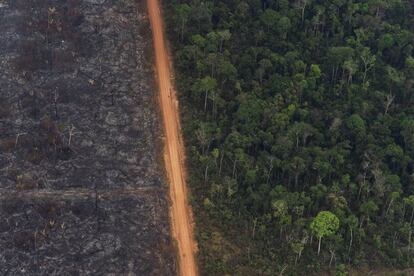
Q. It¡¯s been three years since your impeachment. How do you view those events now?
A. It was more than unfair. It was a coup. My departure was the opening act in a play that has not ended. The second act was empowering a government that adopted measures that had not been approved via the ballot boxes, and introducing a labor reform that created precarious job conditions and which we ourselves would never have implemented. This created the mood for Bolsonaro¡¯s arrival. The television network Globo said that Brazil was broke. What do you mean, broke? Brazil was already broke when Lula da Silva took over the presidency. The coup was aimed at introducing a neo-liberal model. They were irresponsible: they brought together a political and an economic crisis, and saw that there was a chance for Lula to return to power. So first they took steps to criminalize him, which didn¡¯t work out, so they got him convicted and jailed. He was still the favorite in the presidential elections.
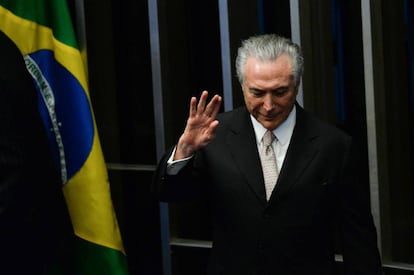
Q. But is that the only reason why Bolsonaro reached power? There¡¯s the corruption in the Lava Jato [Car Wash] case, the plundering of Petrobras¡
A. The center, center-right and right-wing parties self-destructed in the process. We began to shore up the institutions with legislation that made it possible to fight corruption. Lula also gave the federal police additional resources, and I sanctioned a law to combat criminal organizations in 2013, before Operation Lava Jato. In young democracies, institutions run the risk of transforming into corporations, which, as we know, only work to defend their own interests. Judicial institutions have turned into a corporation, and with S¨¦rgio Moro acting as a chief prosecutor in Curitiba, they launched Operation Lava Jato. It is true that they uncovered many things, but the question is, who did they focus on? They focused on Lula.
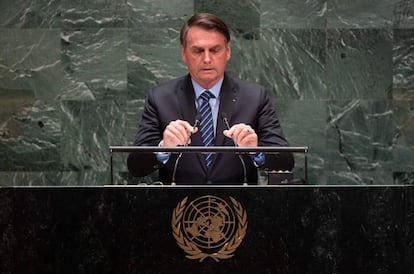
Q. What do you think about the leaks published by The Intercept in collaboration with EL PA?S Brazil regarding Justice Minister Moro?
A. In any other country, prosecutors should be interrogated and even tried. They engaged in irregularities, in a series of illegal and irregular acts. Worse yet, those leaks showed that they had no evidence against Lula and that they compelled false denunciations. As for former president Fernando Henrique Cardoso, who was in the same situation as Lula, Moro wrote: ¡°An ally must not be investigated.¡± Brazilian justice has been compromised. A judge cannot act like an accuser. I don¡¯t know how that situation is going to develop now with a neo-fascist government that attacks all sectors.
Q. How can you get Brazil to fall in love with the PT again?
A. We sustained a defeat. We lost, we came in second, but we are the only ones who survived the far right¡¯s razzia, with 47 million ballots representing 44.8% of the vote. We sustained a defeat, but not a strategic one. The PT kept its dignity. We made some mistakes and did some things right. We prevented neo-liberalism from taking over.
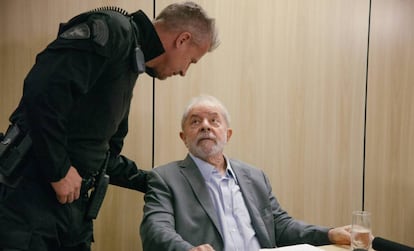
Q. Do you think that self-criticism and new faces will return the PT to power? Are you considering a return to politics?
A. Bolsonaro did not reach power because of our mistakes, but because of our successes. This demand for self-criticism comes from a sector of the media that created the mood that helped Bolsonaro reach power, and by certain business sectors. I may have made a mistake when I approved a tax exemption; it was a big mistake, because entrepreneurs simply put that money into their own pockets. We may have erred through failing to regulate the media oligopoly, which led to the absolute ambition by some Brazilian elites to implement neo-liberal reforms straight away. I am in politics. I believe in the Greek meaning of politics, as a public service.
A. In the Netflix documentary The Edge of Democracy, you say that at some point during your term in office you felt alone.
A. I don¡¯t remember saying that. And if they attributed those words to me, they would be out of context. I was surrounded by colleagues. I was never left alone. And I¡¯ve never been the type to say: ¡°Oh poor me, I¡¯m all alone.¡±
Q. How do you see the left in Latin America?
A. I look at it with great hope. We had L¨®pez Obrador [in Mexico], and now there is a chance in Argentina for a victory by Alberto Fern¨¢ndez and Cristina Fern¨¢ndez de Kirchner, for them to come back¡ because the government of [Mauricio] Macri illustrates where political conceit can take you. Let¡¯s recall what was said when he won ¨C that he would save Argentina from chaos, that he would be very successful because he is a businessman and he would run very efficient policies. So what has he achieved? The debt levels are huge. And it¡¯s odd that the International Monetary Fund is approving a $56 billion loan that fails to meet technical parameters. They¡¯re going to bankrupt Argentina once again.
English version by Susana Urra.
Tu suscripci¨®n se est¨¢ usando en otro dispositivo
?Quieres a?adir otro usuario a tu suscripci¨®n?
Si contin¨²as leyendo en este dispositivo, no se podr¨¢ leer en el otro.
FlechaTu suscripci¨®n se est¨¢ usando en otro dispositivo y solo puedes acceder a EL PA?S desde un dispositivo a la vez.
Si quieres compartir tu cuenta, cambia tu suscripci¨®n a la modalidad Premium, as¨ª podr¨¢s a?adir otro usuario. Cada uno acceder¨¢ con su propia cuenta de email, lo que os permitir¨¢ personalizar vuestra experiencia en EL PA?S.
En el caso de no saber qui¨¦n est¨¢ usando tu cuenta, te recomendamos cambiar tu contrase?a aqu¨ª.
Si decides continuar compartiendo tu cuenta, este mensaje se mostrar¨¢ en tu dispositivo y en el de la otra persona que est¨¢ usando tu cuenta de forma indefinida, afectando a tu experiencia de lectura. Puedes consultar aqu¨ª los t¨¦rminos y condiciones de la suscripci¨®n digital.
